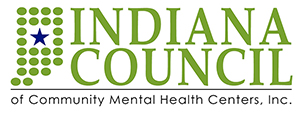Legislative Platform
Indiana Council 2025 Legislative and Public Policy Platform
1. CCBHC & CRISIS FUNDING
Problem: The current CMHC system struggles from lack of resources, a complicated reimbursement structure, and workforce shortages. This leads to disjointed service delivery and an inability to treat patients where they are.
Solution: Certified Community Behavioral Health Clinics (CCBHCs) is a federal outpatient model that allows for flexible funding and offers expanded services. Indiana was selected by the federal government to be a part of the demonstration. The state selected 8 CMHCs to participate.
There are a lot of potential savings that come from the CCBHC model from diversions from the emergency department and law enforcement expenses. CCBHCs have also shown to greatly increase access to services. CMHCs who have already begun moving to this model have seen wait times decrease from 6 months to now can provide same-day services.
To continue to offer these services and support the state match for CCBHC, we are requesting an increase in mental health funding. CMHCs have proven to be good stewards of the state’s investment into our mental health system ensuring individuals in crisis are receiving the right level of treatment at the right time. Additional funding will secure continued crisis services coverage across the state and that CMHCs can build the necessary infrastructure for CCBHC.
2. BUILDING SUPPORT FOR GROUP HOMES FOR THE SERIOUSLY MENTALLY ILL
Group homes primarily serve the seriously mentally ill (SMI) population, this includes those diagnosed with schizophrenia, bipolar disorder, post-traumatic stress disorder, etc.
Problem: As the SMI population ages, the current funding structure for group homes is not sustainable. CMHCs must navigate complex braided funding to provide care, and it is not sufficient to meet this population’s needs.
Solution:
We are advocating for a standard room and board rate for group homes. Without a more reliable funding source there is a risk of beds closing, leaving longer wait times for the SMI within our State Hospital system. There is currently an admission waitlist at the State Hospitals for over 100 individuals. This group home room and board rate will allow providers to have a stable and simplified funding source to care for the behavioral health needs of this unique population and ensure that beds can remain open for future patients.
Building support for the Community Mental Health Workforce:
The current behavioral health workforce is a mixture of licensed and unlicensed personnel. While these individuals are in clinical practice, it can become confusing what coursework applies to which profession and certain overlapping requirements. To help these professionals navigate the confusion, streamlining the licensure process is essential. For example, extending the temporary licensure permit from 1 to 2 years. Policy changes like this will give clinicians more of a runway to sort out clinical supervision, licensure examinations, etc.
Administrative burden is also a difficulty our clinicians face. There are redundant audits and taxing prior authorization that is unclear and diverts time and energy away from patient care. Streamlining these processes would assist providers in being able to focus on delivering high-quality care.

